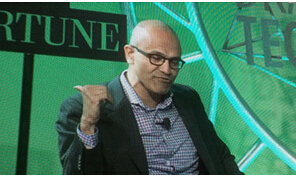
Microsoft must change.
微軟(Microsoft)必須改變。
Microsoft should focus on its core—and Xbox isn’t it.
微軟應(yīng)該專注于它的核心——Xbox不是它的核心競爭力。
Microsoft has to differentiate itself in the marketplace, and productivity is the way to do it.
微軟必須在市場彰顯自身的不同之處,而它的獨(dú)到之處在于生產(chǎn)力。
Microsoft could really do a better job marketing itself.
微軟的確可以改善營銷工作。
Microsoft ought to find a way to make Windows as identifiable with wearable technology as it is with the personal computer.
微軟應(yīng)該找到一種方法,使Windows在可穿戴技術(shù)領(lǐng)域成為像它在個(gè)人電腦技術(shù)領(lǐng)域一樣具有辨識度的產(chǎn)品。
Microsoft needs to be mobile.
微軟需要挺進(jìn)移動領(lǐng)域。
Satya Nadella, the chief executive of the Redmond, Wash.-based company MSFT 0.12% , took to the stage here at the Fortune Brainstorm Tech conference to reiterate the strategy that he outlined in a memo sent to his 127,104 employees last week and otherwise show that he had control of a company that has been criticized as clumsy and directionless.
薩蒂亞o納德拉,微軟這家總部位于華盛頓州雷德蒙德的公司的首席執(zhí)行官在《財(cái)富》科技頭腦風(fēng)暴大會(Fortune Brainstorm Tech)的舞臺上重申了他在上周發(fā)給公司127,104名員工的一份備忘錄中概述的戰(zhàn)略,同時(shí)通過其他方式展示,他已經(jīng)掌控了這家一直被批評為笨拙不堪、迷失方向的公司。
In a rapid-fire chat with Walter Isaacson, president of the Aspen Institute, an affable Nadella stayed strictly on message. His goal: to demonstrate that he’s listening (when it comes to criticism of the company), he’s looking (when it comes to finding a path forward), and he’s learning (that investors and developers alike seek confidence in the company).
在跟阿斯本研究所(Aspen Institute)總裁沃爾特o艾薩克森猶如連珠炮似的對話中,和藹可親的納德拉始終恪守他打算傳遞的訊息。他的目標(biāo):表明他正在聆聽(種種批評聲音),他正在尋找(一條前進(jìn)道路),他正在認(rèn)識到(投資者和開發(fā)商都在尋找對公司的信心)。
What should Microsoft be known for? “Productivity,” Nadella responded without hesitation. “The unique value that Microsoft can add is around productivity and platforms,” he said. “Productivity is broadly something we can uniquely do.”
微軟應(yīng)該擁有什么名聲?“生產(chǎn)力,”納德拉毫不猶豫地回答道。“微軟能夠增加的獨(dú)特價(jià)值都是圍繞著生產(chǎn)力和平臺,”他說。“就廣義而言,生產(chǎn)力是我們能夠做出獨(dú)特貢獻(xiàn)的領(lǐng)域。”
Productivity isn’t just about the workplace, he said. Think of it on an individual basis, extending to the home and on the go. “Can I get more out of every moment of my life and do I need tools and services to help me?” he asked.
他說,生產(chǎn)力不只涉及工作場所。請從個(gè)人的角度來考慮這個(gè)問題,生產(chǎn)力可延伸到家庭和外出旅途中。他反問:“我可以從人生的每一刻獲取更多價(jià)值嗎?我是否需要工具和服務(wù)來幫助我?”
When you’re cooking at home and you snap a photo of a recipe in a book using your phone and software then employs optical character recognition to translate it? “That’s productivity for my life, not at work,” Nadella said.
比如,當(dāng)你在家做飯,使用手機(jī)在一本書中拍了一張菜譜照片,軟件隨即會采用光學(xué)字符識別技術(shù)將菜譜內(nèi)容翻譯出來。納德拉說:“這就是面向生活、而不是工作的生產(chǎn)力。”
On being a ‘platform company’
關(guān)于做一家“平臺公司”
“The notion that everything that we do has to be a platform for someone else to build on I would say is the core of our company,” Nadella told Isaacson, citing the identity system in Exchange and the Windows shell. “But I think of your personal data inside of the tools like Office exposed as services to developers provided as administrative tools to IT.”
“我們所做的一切都必須成為其他人依靠的平臺,我認(rèn)為這種理念是我們公司的核心所在,”納德拉告訴艾薩克森,同時(shí)援引了Exchange識別系統(tǒng)和Windows Shell的例子。“但我認(rèn)為大家暴露在Office等工具內(nèi)部的個(gè)人數(shù)據(jù)可以作為一種管理工具提供給IT服務(wù)開發(fā)商。”
People need to start thinking about Office much more broadly, rather than only as a collection of applications, Nadella said. Take the company’s intelligent personal assistant, Cortana: “To me that’s the redefinition of productivity” because it touches all of your personal information, whether work or personal, he said.
納德拉表示,人們需要用更開闊的思路來看待Office,而不是僅僅把它看成是一個(gè)應(yīng)用程序集合。就以該公司的智能個(gè)人助理Cortana為例:“在我看來,這是對生產(chǎn)力的重新定義,”他說,因?yàn)樗|及大家所有的個(gè)人信息,既包括工作信息,還包括私人信息。
“Making more sense out of my data, my needs, my tasks—to me, that’s the future of Office,” Nadella said.
納德拉說:“從我的數(shù)據(jù)、我的需求、我的任務(wù)中發(fā)掘更有意義的訊息——在我看來,這就是Office的未來。”
Nadella acknowledged the disparity between Microsoft’s market share in the declining PC business—90%—and its market share in a computing business that has quickly been dominated by mobile devices. (Microsoft enjoys just 14% share across all devices, he conceded.)
納德拉承認(rèn),微軟在不斷下滑的個(gè)人電腦業(yè)務(wù)和迅速被移動設(shè)備占據(jù)的計(jì)算業(yè)務(wù)占據(jù)的市場份額存在顯著差異,前者為90%。(他承認(rèn),微軟在橫跨所有設(shè)備的市場份額僅有14%。)
“We have a lot of work to do still as we navigate this mobile-first world,” he said.
他說:“要在這樣一個(gè)移動優(yōu)先的世界自由穿行,我們還需要做大量工作。”
Which is why the company is so focused on the cloud, the fabric that connects all Internet-connected devices. “Our goal with the cloud is to make sure that our cloud and our cloud applications are available on every device in the world,” Nadella said, adding that the company measures its success by looking at the home screen of a device.
這就是為什么這家公司這么專注于云計(jì)算這種連接所有互聯(lián)網(wǎng)連接設(shè)備的構(gòu)架。納德拉說:“我們在云計(jì)算方面的目標(biāo)是,確保我們的云計(jì)算和云應(yīng)用程序出現(xiàn)在全球每臺設(shè)備之上。”他隨后補(bǔ)充說,微軟衡量成功的方式是查看一臺設(shè)備的主屏幕。
The cloud doesn’t solve people’s problems, but it enables other services and tools to do so. That’s why Microsoft is focused on it. “It’s a cloud-orchestrated world,” he said.
云無法解決人們的問題,但它能夠讓其他服務(wù)和工具完成這件事情。這就是微軟專注于云的原因所在。他說:“這是一個(gè)由云協(xié)調(diào)的世界。”
Which is how the company is approaching the nascent wearables market. Instead of trying to invent something new, Nadella said, Microsoft can stretch and adapt its best-known product: Windows.
微軟正是通過這種方式進(jìn)入新生的可穿戴市場。不是嘗試著發(fā)明新的東西,納德拉說,微軟可以拉伸、調(diào)整它最知名的產(chǎn)品:Windows。
“When we think about Windows, we want to think of it as a broad platform, from wearables to industrial IoT platforms to PCs and tablets,” he said, using the acronym for Internet of Things. Still, “Windows for us will always be the device experience,” and Microsoft can experiment firsthand thanks to its acquisition of Nokia’s devices business.
他說:“至于Windows,我們希望把它看作是一個(gè)廣闊的平臺,從可穿戴設(shè)備到工業(yè)IoT平臺,再到個(gè)人電腦和平板電腦。”所謂IoT是物聯(lián)網(wǎng)(Internet of Things)的首字母縮寫。盡管如此,“對我們來說,Windows永遠(yuǎn)是一種設(shè)備體驗(yàn),”由于微軟收購了諾基亞公司(Nokia)的設(shè)備業(yè)務(wù),它現(xiàn)在可以從事第一手實(shí)驗(yàn)。
“Our hope is to bring these experiences around productivity from the small screen to the large screen,” he said. At its peak, one of the things Microsoft did best was when it brought developers and IT professionals together. “We don’t over-index on just one constituent,” Nadella said. “That’s our magic.”
他說:“我們希望把這些圍繞生產(chǎn)力的體驗(yàn)從小屏幕帶到大屏幕。”在最輝煌的時(shí)期,微軟干得最漂亮的事情之一就是它把開發(fā)商和IT專業(yè)人士拉到了一起。“我們不會過分看重某一個(gè)受眾群體,”納德拉說。“這是我們的法寶。”
But Microsoft can’t rely on history to move forward. “Windows as we know of it has to change,” he said. Windows is already on the gaming console and the mobile phone. “But is it the Windows that we booted up on our PCs at home five, 10 years ago?” Nadella asked. “No.”
但微軟不能依靠歷史經(jīng)驗(yàn)向前推進(jìn)。“我們所熟知的Windows必須做出改變,”他說。Windows已經(jīng)成為游戲機(jī)和手機(jī)的操作系統(tǒng)。“但它是5年或10年前,我們在家里的個(gè)人電腦上啟動的那個(gè)Windows嗎?”納德拉問道。“不是。”
On strategy and culture
關(guān)于戰(zhàn)略和文化
Microsoft needs to focus on its productivity core. Does the Xbox group fit into Nadella’s vision? The chief executive hedged a bit.
微軟需要把重點(diǎn)放在它的生產(chǎn)力核心。那么,Xbox游戲機(jī)是否契合納德拉的愿景?這位首席執(zhí)行官的回答有點(diǎn)閃爍其詞。
“Xbox isn’t that far from [the core],” Naella said. “We can do a few more things than the core. But the point is, you’ve got to have a culture to do it.”
“Xbox距離(這個(gè)核心)沒有那么遠(yuǎn),”納德拉說。“我們可以做比這個(gè)核心更多一些的事情。但問題是,你必須得擁有一種能夠這樣做的文化。”
In other words, you can’t treat the Xbox division like an operating systems group, he said.
換句話說,你不能把Xbox部門當(dāng)作一個(gè)操作系統(tǒng)部門,他說。
“I want us to be comfortable to be proud of Xbox, to give it the air cover of Microsoft,” Nadella said, “but at the same time not confuse it with our core.”
“我希望我們能夠以Xbox為傲,無拘無束地給予它以微軟的空中掩護(hù),”納德拉說。“但與此同時(shí),不能把它跟我們的核心相混淆。”
Though “you need to have places you can incubate things,” you also need to “innovate from the core,” he said. It’s how Microsoft will be renewed again.
“我們需要一些能夠孵化新東西的部門,”但也需要“從核心出發(fā)來創(chuàng)新,”他說。這將成為微軟的再次革新之道。
“We are good at productivity and platforms—but rethink it,” he said. “That’s not a side project, that is the very company itself.”
“我們擅長生產(chǎn)力和平臺,但需要重新思考,”他說。“它不是一個(gè)附帶項(xiàng)目,而是微軟這家公司的立身之本。”
He peered out over the audience. “Until we really change culturally, no renewal happens.”
他凝視著臺下的觀眾。“直到我們真正改變文化,微軟才有希望迎來復(fù)興。”


